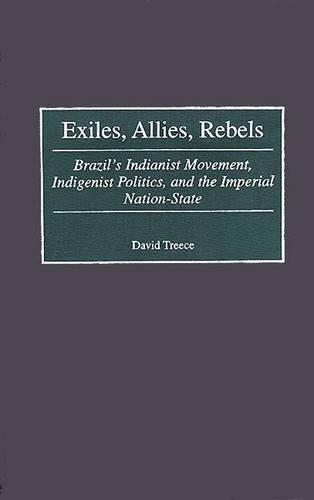
Exiles, Allies, Rebels: Brazil's Indianist Movement, Indigenist Politics, and the Imperial Nation-State
(Hardback)
Publishing Details
Exiles, Allies, Rebels: Brazil's Indianist Movement, Indigenist Politics, and the Imperial Nation-State
By (Author) David Treece
Bloomsbury Publishing PLC
Praeger Publishers Inc
30th April 2000
United States
Classifications
Tertiary Education
Non Fiction
History of the Americas
Indigenous peoples / Indigeneity
Colonialism and imperialism
Political leaders and leadership
981.00498
Physical Properties
Hardback
288
Description
A global study of one of the important intellectual and artistic movements in Brazilian cultural history before Modernism. The Indianist movement, under the direct patronage of the Emperor Pedro II, was a major pillar of the Empire's project of state-building, involving historians, poets, playwrights and novelists in the production of a large body of work extending over most of the 19th century. Tracing the parallel history of official indigenist policy and Indianist writing, the book reveals the central role of the Indian in constructing the self-image of state and society under Empire. It aims to historicize the movement, examining it as a literary phenomenon, both with its own invented traditions and myths, and standing at the interfaces between culture and politics, between the Indian as imaginary and real. As this book demonstrates, the Indianist tradition was not merely an example of Romantic exoticism or escapism, recycling infinite variations on a single model of the Noble Savage imported from the European imaginary. Instead, it was a complex, evolving tradition, inextricably enmeshed with the contemporary political debates on the status of the indigenous communities and their future within the post-colonial state. These debates raised much wider questions about the legacy of colonial rule -the persistence of authoritarian models of government, the social and political marginalization of large numbers of free but landless Brazilians, and above all the maintenance of slavery. The Indianist "stage" offered the Indian alternately as tragic victim and exile, as rebel and outlaw, as alien to the social pact, as mother or protector of the post-colonial Brazilian family, or as self-sacrificing ally and "voluntary slave".
Reviews
[A] valuable and enjoyable book that taps a rich vein in the history of Brazilian identity.-Latin American Studies
[P]rovides a valuable supplement to anthropological acccounts of the emergence of indigenismo and indianismo in Brazilian policy and literature, respectively, by focusing on literary production during the eighteenth and nineteenth centuries in Brazil.-Latin American Research Review
In this penetrating study of Indianism in colonial and nineteenth-century Brazilian literature, David Treece offers a sopisticated and textured analysis of the sociopolitical milieux that engendered this genre...Treece's book suceeds in demonstrating how Indianism, more than a romantic throwback, was characterized by a broad array of ideological perspectives and political agendas that often reflected its interlocutors' social backgrounds and relationships to the imperial state...Treece's meticulously researched book offers a historically grounded analysis that is a much welcome addition to the slim but growing body of literature on indigenous peoples in Brazil.-Luso-Brazilian Review
The research is thorough, the arguments sophisticated, and the book rewarding for the specialist.-Choice
"A valuable and enjoyable book that taps a rich vein in the history of Brazilian identity."-Latin American Studies
"Provides a valuable supplement to anthropological acccounts of the emergence of indigenismo and indianismo in Brazilian policy and literature, respectively, by focusing on literary production during the eighteenth and nineteenth centuries in Brazil."-Latin American Research Review
"[A] valuable and enjoyable book that taps a rich vein in the history of Brazilian identity."-Latin American Studies
"[P]rovides a valuable supplement to anthropological acccounts of the emergence of indigenismo and indianismo in Brazilian policy and literature, respectively, by focusing on literary production during the eighteenth and nineteenth centuries in Brazil."-Latin American Research Review
"The research is thorough, the arguments sophisticated, and the book rewarding for the specialist."-Choice
"In this penetrating study of Indianism in colonial and nineteenth-century Brazilian literature, David Treece offers a sopisticated and textured analysis of the sociopolitical milieux that engendered this genre...Treece's book suceeds in demonstrating how Indianism, more than a romantic throwback, was characterized by a broad array of ideological perspectives and political agendas that often reflected its interlocutors' social backgrounds and relationships to the imperial state...Treece's meticulously researched book offers a historically grounded analysis that is a much welcome addition to the slim but growing body of literature on indigenous peoples in Brazil."-Luso-Brazilian Review
Author Bio
DAVID TREECE is Reader in Brazilian Studies and Director of the Centre for the Study of Brazilian Culture and Society, King's College London, where he has lectured since 1987. He has worked with a number of Latin America-related NGOs, including the human rights organization Survival for tribal peoples. He is a translator of Brazilian fiction and poetry, and he teaches and researches on Brazilian popular music, poetry, literature and other aspects of Brazilian culture. He is also an editor of the international Journal of Latin American Cultural Studies.
